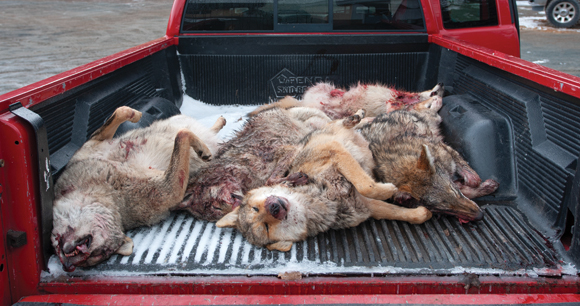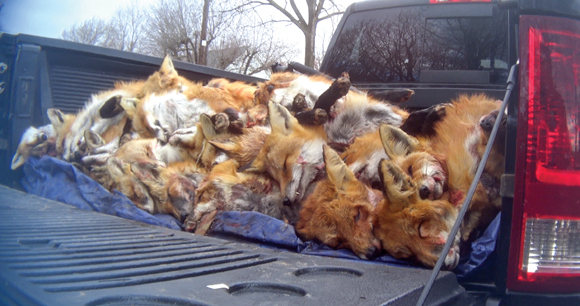As dusk falls, two men, assault-style weapons in hand, crouch in an open field. One sets up a device that begins to play recorded sounds of a coyote pup in distress, amplified through speakers. Then they settle in and wait. Soon, a coyote appears in the distance. Similar to humans, coyotes have a strong bond to other members of their species, and when they detect cries for help, they are drawn to the sound to investigate. When the coyote comes within range, one of the men aims his gun—equipped with a thermal night vision scope—and fires. The animal collapses, and the man jogs out to collect the mangled body. This happens again, and again, with each new body swung into a growing pile of bloody carcasses. By the end of the evening, the pile has grown to 10 animals. The question, for these men, is whether it is enough—enough for them to secure the cash and prizes that led them on this killing spree in the first place. For these men are one of many teams competing in a wildlife killing contest, and they don’t want to walk away empty-handed.

Wildlife killing contests are organized events in which participants kill animals for money, prizes, entertainment, and other inducements, with “winners” recognized in categories such as the number, weight, and size of animals killed. The contests predominantly target native carnivores, including coyotes, foxes, bobcats, and even wolves and mountain lions, as well as other species such as raccoons, squirrels, and rabbits. Each year, over a thousand of these contests are held in over 40 states, with little or no regulation. Just one contest can result in hundreds of animals being wiped off a landscape in a single weekend.
There are many reasons to oppose these events. First, the mass killing of animals during contests is cruel, barbaric, and wasteful. Principles of fair chase are frequently disregarded, with participants using bait and electronic distress calls of wounded young to draw animals in. The events themselves leave an untold number of young in severe distress: After their parents are killed, the orphaned juveniles are left to die from thirst, starvation, predation, or exposure. Investigative video footage has shown contest participants joking about the methods used to lure and kill the animals, and laughing and posing for photos in front of piles of dead animals. Afterwards, away from public view, the carcasses of the animals are usually dumped. The entire undertaking demonstrates a complete lack of respect for wildlife, promotes gratuitous violence, and sends the irresponsible and disturbing message that wanton killing is both acceptable and fun. Numerous state agencies and officials have expressed concern that killing contests undermine the reputation of sportsmen and sportswomen and damage the tradition of hunting.
Second, the indiscriminate killing promoted by wildlife killing contests is counterproductive to effective, science-based wildlife management. Studies have shown that many wildlife populations depleted by unnatural means simply reproduce more quickly due to the sudden drop in competition for resources and changes to social structure from the loss of individuals. This effect is well documented, in particular, for populations of coyotes, the species most commonly targeted in contests. State wildlife management agencies across the country recognize that killing contests do not effectively control coyote population size. Furthermore, removing large numbers of coyotes from the landscape should not be a desired goal. Doing so negatively impacts the environment because coyotes are an integral part of healthy ecosystems. They consume carrion, remove sick animals from the gene pool, disperse seeds, protect ground-nesting birds from smaller carnivores, help control disease transmission by keeping rodent populations in check, and increase the biological diversity of plant and wildlife communities.
Third, while contest proponents claim they are necessary to reduce human-wildlife conflicts, such contests may actually increase conflicts with humans, pets, and livestock. Effective management of depredation requires targeting the offending individual and intervening in a timely manner close to the site where the depredations occurred. Killing contests do not represent the kind of targeted effort required for successful management of livestock depredations because they are not effective in removing individual, problem-causing animals. Moreover, indiscriminate killing of predators likely exacerbates risks to livestock because killing social carnivores disrupts their social groups and foraging strategies in ways that increase the number of transient individuals, who may be more likely to kill livestock. Additionally, as noted above, targeted coyote packs often respond by producing more pups, and the need to feed a large litter has been found to be a significant motivation for coyotes to switch from killing small and medium-sized prey to killing sheep. Killing coyotes can also create ecological voids that may be filled by smaller predators with higher population numbers that may prey on farm animals.

Fourth, the best available science indicates that indiscriminately killing native carnivores is not an effective method for increasing game species abundance. In recognition of this science, many state commissions and agencies, including those in New York, Illinois, Louisiana, Missouri, North Carolina, Pennsylvania, South Carolina, Vermont, West Virginia, and Wyoming, have concluded that reducing predator numbers will not enhance populations of ungulates, small game animals, and game birds. Rather, the most important management tool to increase most game species is to decrease the harvest of females, followed by protection of habitat.
Fortunately, these contests are in the crosshairs. AWI and other groups have joined forces to ban these horrific events at state and federal levels. AWI is a member of the steering committee of the National Coalition to End Wildlife Killing Contests, which advocates for humane wildlife management while raising public awareness about how contests disrupt ecosystems and promote animal cruelty. The coalition initiates and supports action to ban contests through legislation, litigation, and regulatory reform. Our ultimate goal is to end all such contests across the country.
To date, eight states have enacted bans on certain types of wildlife killing contests: California banned the awarding of prizes for killing furbearing and nongame mammals in 2014; Vermont and New Mexico outlawed coyote killing contests in 2018 and 2019, respectively; Arizona and Massachusetts prohibited killing contests that target predator and furbearer species in late 2019; Colorado and Washington banned killing contests that target certain furbearers, predators, and small game animals in 2020; and Maryland outlawed killing contests targeting particular predators and other species without bag limits in 2021.
AWI has been actively engaged in many of these successful state efforts. We led the campaign to ban killing contests in Colorado by coauthoring a citizens’ petition to the Colorado Parks and Wildlife Commission proposing a ban, organizing a coalition of animal and environmental protection groups in the state, testifying before and submitting memoranda to the commission, and writing a coalition letter backing a ban. AWI supported successful efforts in Arizona, Maryland, Massachusetts, and Washington as well by submitting written testimony, creating educational materials, and engaging our members to take a stand against these contests. We continue to collaborate with other organizations on efforts currently underway to ban contests in Nevada, New Jersey, New York, North Carolina, Oregon, and Virginia. At the federal level, AWI is working with other groups to develop legislation that would ban contests that fall under federal jurisdiction.
It is abundantly clear that wildlife killing contests have no place in a civil society or in modern, science-based wildlife management. They turn wanton slaughter into sport and serve no legitimate wildlife management purpose—indeed, they are antithetical to the conservation ethic that is necessary to ensure the long-term protection of wildlife populations. It is time for such contests to be sidelined for good.
Help Us End Wildlife Killing Contests!
- Please take action to help end wildlife killing contests. Here are some steps you can take:
- Call, send letters, and meet with your state legislators to encourage them to ban wildlife killing contests. Find their contact information here: bit.ly/CIDirectory
- Call, send letters, and meet with your state’s wildlife agency staff and wildlife commissioners to encourage them to ban wildlife killing contests. Find their contact information here: bit.ly/CIStateAg
- Advocate bans on wildlife killing contests, including by politely urging event hosts and sponsors to stop supporting these events. Use this guide: bit.ly/EndWKC
- Encourage your city or county council to pass a resolution or an ordinance against wildlife killing contests. Use this guide: bit.ly/WKCResolution
- Write a letter to the editor of your newspaper to raise awareness about killing contests and to encourage readers to express their opposition to the contests to their lawmakers. You can write your letter directly from this website: bit.ly/CIndexLtE (For letter-writing tips visit bit.ly/LtEtips)
- Educate your family, neighbors, and friends about wildlife killing contests and what they can do to help end them. Post on social media and send them this informational postcard: bit.ly/WKCinfo
- Host a virtual screening of the documentary KILLING GAMES—Wildlife in the Crosshairs and invite stakeholders to attend: bit.ly/KGWCfilm